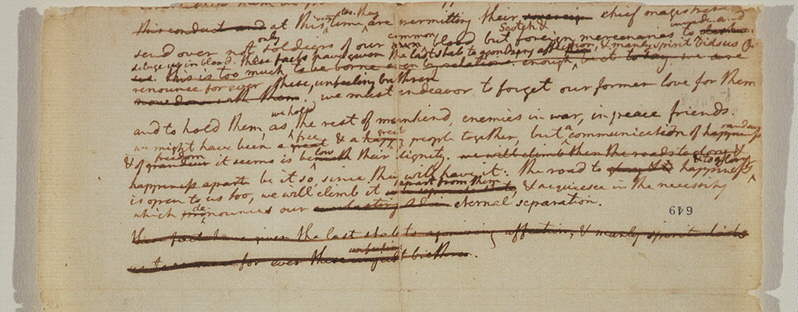About Publications Library Archives
heritagepost.org

Preserving Revolutionary & Civil War History

Preserving Revolutionary & Civil War History

Annotation: This is the only surviving fragment of the earliest draft of the Declaration of Independence. This fragment demonstrates that Jefferson heavily edited his first draft of the Declaration of Independence before he prepared a fair copy that became the basis of “the original Rough draught.” None of the deleted words and passages in this fragment appears in the “Rough draught,” but all of the undeleted 148 words, including those careted and interlined, were copied into the “Rough draught” in a clear form.
The writing on the bottom half of the sheet is Jefferson’s draft of a resolution on the resignation of General John Sullivan, July 26, 1776.
Document: re-establishing them in po[wer…] (this conduct and) at this very time too, they are permitting their (sovereign) chief magistrate to send over not only soldiers of our (own) common blood but Scotch & foreign mercenaries to (destroy us) invade and deluge us in blood. (this is too much to be borne even by relations. enough then be it to say, we are now done with them.) these facts have given the last stab to agonizing affection, & manly spirit bids us to renounce for ever these unfeeling brethren! we must endeavor to forget our former love for them and to hold them, as we hold the rest of mankind, enemies in war, in peace friends. we might have been a (great) free & a (happy) great people together, but a communicat(ed)ion of (happiness) [g]randeur & of (grandeur) freedom it seems is be(neath)low their dignity. (we will climb then the roads to glory & happiness apart) be it so, since they will have it: the road to (glory &) (to) happiness & to glory is open to us too, we will climb it (in a separate state) apart from them & acquiesce in the necessity which (pro) denounces our (everlasting Adieu) eternal separation. (these facts have given the last stab to agonizing affection, & manly spirit bids us to renounce for ever these unjust) (unfeeling) (brethren.)
Note: Words in parentheses are those crossed out by Jefferson in the original.